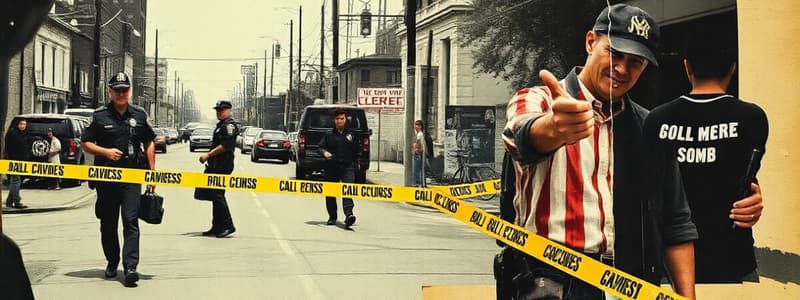Podcast
Questions and Answers
What is the primary responsibility of a deputy when marking evidence?
What is the primary responsibility of a deputy when marking evidence?
- To document the chain of custody on the item itself
- To protect the item from loss without destroying fingerprints or trace evidence (correct)
- To make the item as accessible as possible for further analysis
- To ensure the item is easily visible to others at the scene
When should a deputy assume custody of a firearm found at a crime scene?
When should a deputy assume custody of a firearm found at a crime scene?
- Only after Crime Scene Unit Deputies have arrived at the scene
- When the firearm obviously needs to be moved to prevent loss or damage (correct)
- Immediately, as all firearms must be secured by the first responder
- After completing a full initial survey of the crime scene
What step should a deputy take after securing a firearm in their patrol vehicle?
What step should a deputy take after securing a firearm in their patrol vehicle?
- Clean the firearm to remove dirt or potential contaminants
- Unload the firearm to prevent potential risk during transport
- Place the firearm in the vehicle's glove compartment for safekeeping
- Document the firearm's condition and recovery location in a report (correct)
What is the initial task of a Crime Scene Unit Deputy upon arriving at a crime scene?
What is the initial task of a Crime Scene Unit Deputy upon arriving at a crime scene?
What should a deputy avoid when handling a firearm as evidence?
What should a deputy avoid when handling a firearm as evidence?
What should a deputy do if they observe suspicious activities on the way to the crime scene?
What should a deputy do if they observe suspicious activities on the way to the crime scene?
When is a deputy authorized to handle physical evidence at a crime scene?
When is a deputy authorized to handle physical evidence at a crime scene?
What is the MOST important action to take after securing the crime scene to maintain its integrity?
What is the MOST important action to take after securing the crime scene to maintain its integrity?
When should a deputy brief a supervisor about the crime scene investigation?
When should a deputy brief a supervisor about the crime scene investigation?
If a crime scene has injured individuals, what is the first action a deputy should take, after ensuring their own safety?
If a crime scene has injured individuals, what is the first action a deputy should take, after ensuring their own safety?
Prior to processing a major crime scene, which action must Crime Scene Unit Deputies take?
Prior to processing a major crime scene, which action must Crime Scene Unit Deputies take?
What is the responsibility of the follow-up unit investigator when they find it necessary to move an object before the Crime Scene Unit Deputy arrives?
What is the responsibility of the follow-up unit investigator when they find it necessary to move an object before the Crime Scene Unit Deputy arrives?
What is the first action deputies should take at a homicide crime scene?
What is the first action deputies should take at a homicide crime scene?
Who is authorized to enter a homicide scene, besides emergency medical personnel?
Who is authorized to enter a homicide scene, besides emergency medical personnel?
Which of these actions is NOT the responsibility of the Crime Scene Unit Deputy?
Which of these actions is NOT the responsibility of the Crime Scene Unit Deputy?
Flashcards
Securing the Crime Scene
Securing the Crime Scene
Immediately secure the crime scene and prevent unauthorized access to preserve any physical evidence.
Entering the Crime Scene Safely
Entering the Crime Scene Safely
First responders should be aware of potential dangers and use caution when entering the scene to avoid accidentally destroying evidence.
Suspect Information Collection
Suspect Information Collection
Obtain detailed information about the suspect, including their appearance, direction of travel, and whether they were armed, to aid in the investigation.
Maintaining Scene Integrity
Maintaining Scene Integrity
Signup and view all the flashcards
Detailed Documentation
Detailed Documentation
Signup and view all the flashcards
Protecting evidence
Protecting evidence
Signup and view all the flashcards
Marking evidence
Marking evidence
Signup and view all the flashcards
Handling firearms as evidence
Handling firearms as evidence
Signup and view all the flashcards
Documenting evidence handling
Documenting evidence handling
Signup and view all the flashcards
Crime Scene Unit Deputy's initial assessment
Crime Scene Unit Deputy's initial assessment
Signup and view all the flashcards
First Deputy
First Deputy
Signup and view all the flashcards
Assigned Patrol Division Sergeant
Assigned Patrol Division Sergeant
Signup and view all the flashcards
Crime Scene Unit
Crime Scene Unit
Signup and view all the flashcards
Crime Scene Processing
Crime Scene Processing
Signup and view all the flashcards
Crime Scene Area
Crime Scene Area
Signup and view all the flashcards
Study Notes
Bexar County Sheriff's Office Policy Manual - Crime Scene Response
- Policy Objective: Preserve evidence, ensure witness safety, and facilitate accurate information collection at crime scenes.
- Policy Purpose: Outline deputy duties at crime scenes and initial investigations. This policy does not detail evidence collection methods.
- Definitions:
- Res Gestae: Events, statements, and circumstances relating to a specific case, often admissible in court.
- Physical Evidence: The crime scene itself and the most critical evidence is found closest to the crime. Maintaining its integrity is crucial for investigation.
- Crime Scene Dimensions: No set rules exist for defining scene size, but deputies must use training, experience, and common sense to create a reasonable boundary. Priority areas, apparent to trained deputies, must be secured immediately.
- Command/Supervisory Duties:
- Command Deputy: Oversees the scene, possibly delegating supervision to a sergeant. Intervenes if procedures are breached.
- Supervisors: Oversee lower-ranking deputies, including Crime Scene Unit Deputies when appropriate. If a Criminal Investigations Division (CID) supervisor is present, they oversee the follow-up investigations.
- Decisions: In disagreements or with felony/family violence incidents, CID supervisors have authority.
Deputies' Crime Scene Responsibilities
- General Duties: Deputies should document all conditions and events from the approach to arrival at the crime scene, noting any relevant remarks from witnesses, suspects, or complainants. Secure the scene as quickly as possible to maintain evidence integrity. Apprehend suspects if they're at the scene or in the area.
- Providing a Miranda warning to suspects before questioning or interrogating them.
- Preserving from contamination.
- Making initial observations of the crime scene and taking necessary measures to document the scene's condition.
- Ensuring the safety of witnesses.
- Requesting additional personnel or resources, where necessary.
- Crime Scene Processing: Deputies document observations of the scene and its surrounding areas, including vehicles, persons, activities, and related factors. Deputies should also note the time of arrival at the scene.
- Crime Scene Documentation: Obtain descriptions of suspects, means/direction of flight, if applicable, and whether or not the suspect is armed.
- Additional Responsibilities:
- Deputies should notify appropriate personnel, such as EMS or medical services, if required;
- Assess the type of crime committed and the potential time lapse;
- Maintain all physical evidence's integrity;
- Ensure witnesses and suspects are secure, protected and not contaminating the scene;
- Document crime scene procedures using digital or paper reports to include deputies who were at the crime scene and what they did there.
Specialized Crime Scenes
- Homicide/Violent Crime Scenes: Emergency medical assistance must be called, threats/hazards assessed before entry, and specific personnel (first deputy, emergency personnel, medical personnel, Sgt.,additional deputies) must be present and secure the scene for the purpose of further investigation
- Robbery Scenes: Treat suspects as potentially present during initial response. Provide clear descriptions of suspects/means/direction of flight and pertinent information. Protect crime scene entrances/exits.
- Burglary Scenes: Evaluate need for latent print investigation, consider consent of the property owner.
- Recovered Stolen Vehicles : Conduct printing of the recovered vehicles unless specifically requested by vehicle owner/investigators. If processing is necessary, take into account environmental considerations and the seriousness of the crime to determine what is appropriate for the situation.
- Forged Checks: Policy details (not described in study notes).
- Sex Crimes: Reference to other specific policies.
- Crime Scenes in Adult Detention Center: Particular procedures are followed for securing the scene. This includes separating witnesses for further questioning and notification/response of the correct personnel and authorities.
Video Recordings and Digital Evidence
- Digital Evidence: Careful handling of digital storage devices is needed to avoid damage or destruction. Appropriate personnel should determine if the evidence should be handled. Contacting the servicing company if necessary.
- Video Recording of Crime Scene: If the origin is a digital recording, a digital copy must be made to become the master recording. If entry is refused, a supervisor must be notified immediately.
- Crime Scene Unit Deputy Responsibilities for master video recordings: Custody, release, and reporting of digital evidence must be handled by designated personnel.
Studying That Suits You
Use AI to generate personalized quizzes and flashcards to suit your learning preferences.



